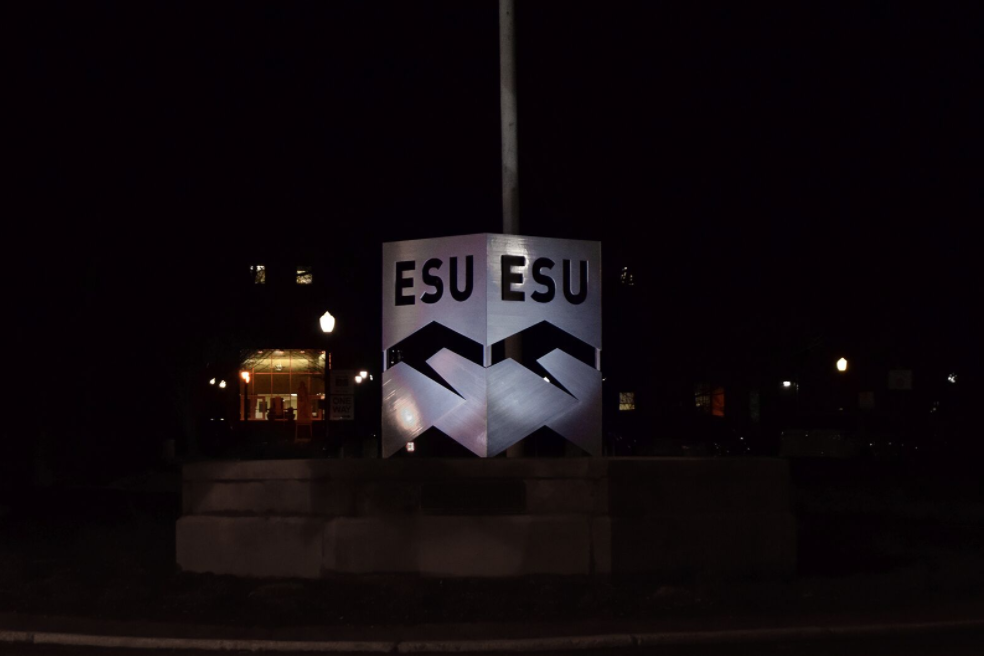
Ayanna Totten
Contributing Writer
A top former ESU official, Isaac Sanders, is suing the Pennsylvania State System of Higher Education for an excess of $50 million.
In the 44-page lawsuit document, Sanders claims he suffered “a travesty of administrative and public lynching” because he was “victimized by unfounded allegations of sexual harassment” and “rumors and innuendo.”
The lawsuit follows an October 2014 case, in which Sanders—formerly vice president of institutional advancement—was found not guilty of sexually assaulting or harassing three former ESU students.
On Feb. 13, 2009, a total of six students filed a lawsuit in the Court of Common Pleas of Monroe County, alleging violations of Title IX of the Education Amendments Act by Sanders and other high-ranking university officials.
Three plaintiffs were dismissed due to the statute of limitations, which is two years for Pennsylvania students.
The allegations against Sanders included unwanted touching, unwelcome comments and forced sexual acts. The students also stated he offered gifts, financial assistance and campus jobs.
The top university administrators at that time, President Robert Dillman, Provost and briefly acting President Kenneth Borland and Victoria Sanders, assistant to the president, were accused of failing to protect students from Sanders. Sanders’ current lawsuit against PASSHE was filed in the United States District Court for the Middle District of Pennsylvania on July 17, 2018, and Judge A. Richard Caputo is assigned to the case.
PASSHE did not choose to waive formal service of a summons when they first received the filed complaint. They were served at their Harrisburg headquarters on Aug. 30, and they must file a motion or answer before Sept. 20.
Sanders and his lawyer, Harry T. Coleman, are requesting a jury trial. Coleman says he believes “eight reasonable jurors, regardless of race, creed or color” will vote in favor of Sanders.
The lawsuit document states PASSHE’s actions led to a deprivation of his fourth and fourteenth amendment rights, “economic and emotional harm,” damage to his professional reputation and “significant legal fees.”
According to Coleman, Sanders has been living with a “cloud over his head for a number of years.” He has applied and been strongly considered for several prestigious positions, but ESU’s claims always become an obstacle.
After ESU terminated Sanders in October 2008, he managed to secure a position at Wiley College in Marshall, Texas, where he remained until Aug. 2014.
A human resources representative at Wiley College stated the department was not aware of Sanders’ previous sexual misconduct allegations when he was hired.
According to a settlement agreement obtained by the Associated Press through a public records request and described in press reports, the state system agreed to pay Sanders’ $240,000 legal bill after Coleman defended him in the 2014 federal civil lawsuit.
Coleman shared that an economist will be using Sanders’ salary at ESU to calculate his loss of earnings, which includes benefits and raises, from his date of termination to his eventual retirement.
Despite the recent lawsuit’s $50 million price tag, Coleman emphasized the damages to Sanders’ reputation are “significant” and “incapable of being quantified.”
Coleman confirmed his client’s sentiments match those expressed in the lawsuit.
According to the lawsuit document, Sanders believes “individuals within the university community at East Stroudsburg, were unsettled by the fact that the highly successful university fundraising at East Stroudsburg was headed by a person of color.”
Coleman clarified that the “public lynching” does not refer to potential racial biases within the trial process, and says his client has the “utmost respect for the state and federal court.”
Between ESU and PASSHE, a total of three investigations about the sexual misconduct allegations against Sanders were conducted. Two of the investigations didn’t provide sufficient evidence to support the former students’ claims, but the third investigation report, which is under court-ordered seal, conducted by PASSHE’s outside firm determined Sanders’ termination.
One of Coleman’s biggest arguments in the lawsuit is ESU received five anonymous letters that influenced this decision, but the letters “provided no information which could either confirm or refute the student’s allegations” and “were merely sent to supplement the erroneous charges leveled against Sanders and force his ouster from the university.”
Sanders claims ESU turned the letters over to PASSHE’s counsel, who provided them to the FBI, the chief federal law enforcement agency in the United States. Coleman continues to allege that prior to the first student’s complaint to ESU regarding Isaac Sanders on Aug. 24, 2007, the university didn’t accept anonymous letters “as a basis for an investigation into discrimination or harassment.”
Kenn Marshall, PASSHE’s media relations manager, said he couldn’t comment on an issue that involves ongoing litigation, but instead stated: “The state system follows all appropriate laws and policies related to allegations of inappropriate conduct. Those laws – both state and federal – certainly have changed over the years, and our board has adopted various policies to ensure compliance with all of those changes.”
Albert Murray Jr., the former students’ lawyer in the 2014 case, did not respond to a request to comment on Sanders’ lawsuit against PASSHE.
Neither Murray nor his clients have passively accepted defeat since Sanders’ not guilty verdict. Murray filed a motion for reconsideration, an appeal and a petition for a writ of certiorari to the Supreme Court — all of which were denied.
“I have no personal thoughts on the students’ testimonies,” Coleman said. “A lot didn’t make sense analytically, and I proved those shortcomings to the jury.”
ESU doesn’t comment on ongoing litigation matters.
Email Ayanna at
atotten@live.esu.edu

